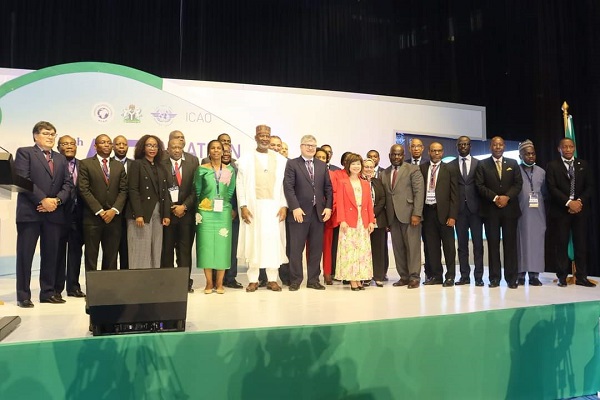
The African Civil Aviation Commission (AFCAC) and Singapore have signed a memorandum of understanding (MoU) to ensure the development of international civil aviation in Africa, just as the International Civil Aviation Organisation (ICAO) has reviewed the impact of the COVID-19 pandemic by taking cognisance of digitalisation and innovation.
The Minister of Aviation, Sen. Hadi Sirika disclosed this at the 7th Africa and Indian Ocean (AFI) Aviation Week Event organised by the ICAO in Abuja recently.
“Nigeria’s determination to host this meeting is borne of the desire to support the growth of air transport in the region and ICAO’s efforts in facilitating the recovery process of the industry from the unprecedented impact of the deadly COVID-19 pandemic.
“I wish to express the gratitude and warm greetings to you all for attending this meeting. I am delighted with the number of high-level personalities participating in this important event – particularly, to have with us the secretary-general, Mr Juan Carlos Salazar. This high-level representation demonstrates the importance and significance attached to this event.
“These programmes have contributed immensely to the development of safety security and facilitation, in the region and have assisted the region in complying with ICAO Standards and Recommended Practices (SARPs), as well as the reduction of the number of states with significant safety concerns (SSCs).
“This event is very important; not just to review the impact of these programmes in the light of the impact of the COVID-19 pandemic but, also, to devise new ways of implementing and achieving their objectives by taking cognisance of digitalisation and innovation, which are now being embraced by the industry. This is the only way we can continue to make these initiatives relevant and sustainable while contributing to the strengthening of safety, security and facilitation in our region. We must bear in mind that a safe, secure and efficient air transport system is a natural impetus for socio-economic development of the region and a means to support trade, tourism and integration. In addition, they will also complement the Single African Air Transport Market (SAATM) and other initiatives of Agenda 2063 of the African Union.
“ICAO’s leadership based on collaboration and coordination with member states and stakeholders should be commended, as this has encouraged member states to collaborate and pool resources in resolving challenges, particularly in the area of enhancing safety in our sub-region. One of the outcomes of such collaboration is the Comprehensive Regional Implementation Plan for Aviation Safety in Africa, which metamorphosed into the Banjul Accord Group Aviation Safety Oversight Organisation (BAGASOO) in the West Africa region, being hosted and substantially funded by Nigeria. This organisation has continued to support the member states in improving their safety oversight capabilities and human resource development.
“I wish to seize this opportunity to appeal to member states here present, the African Civil Aviation Commission (AFCAC) and the ICAO secretary-general to use his good office to revive the ICAO Human Resource Development Fund (HRDF) programme, which has remained inactive since 2018. Nigeria generously contributed to this fund and equally benefited from the inaugural secondment of officers to ICAO. The exposure, experience and knowledge gained by the officers’ attest to the usefulness of the HRDF programme.
“Nigeria will continue to support ICAO’s initiatives and collaborate with member states and development partners on the development of air transport in Africa. I wish to raise the need to address the issue of financing and modernisation of aviation infrastructure in line with the historic Declaration and Framework for Plan of Action for Aviation Infrastructure Development in Africa adopted at the ICAO World Aviation Forum (IWAF) in Abuja in 2017. It is important to recall that as stated by the ICAO Assembly Resolution A40-9, Appendix C Section II Article 7, the Implementation of this declaration should be done under the AFI Plan.”
Sirika appreciated the ICAO members from its regional offices in Dakar and Nairobi, as well as the coordinators of the AFI Plan, AFI SECFAL and the RASFALG-AFI, for sustaining the initiatives over the years.
He further thanked the regional directors of the ICAO, WACAF and ESAF, as well as the ICAO team for organising this event, before applauding the Nigerian Civil Aviation Authority (NCAA) for its invaluable support and input.

